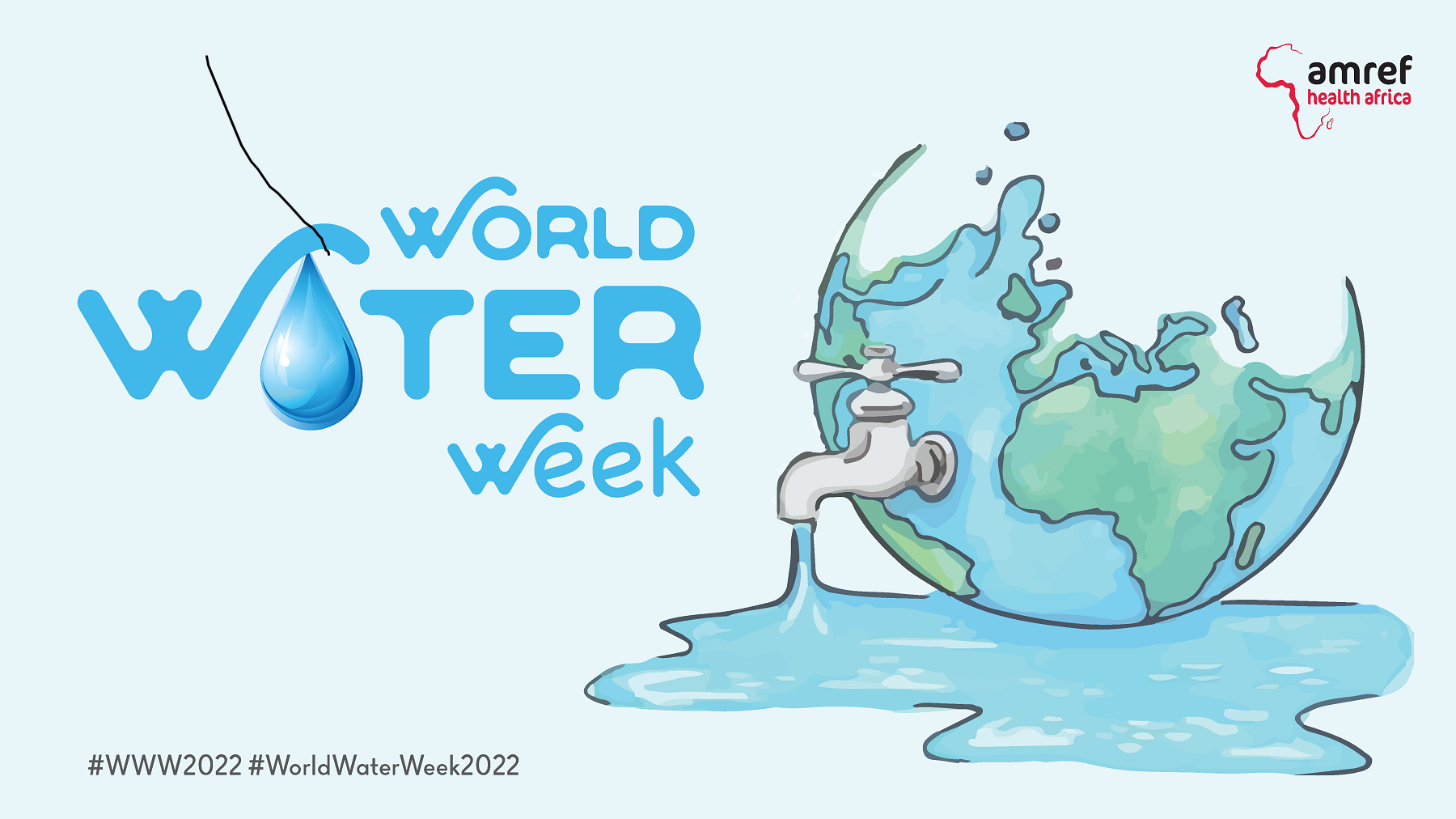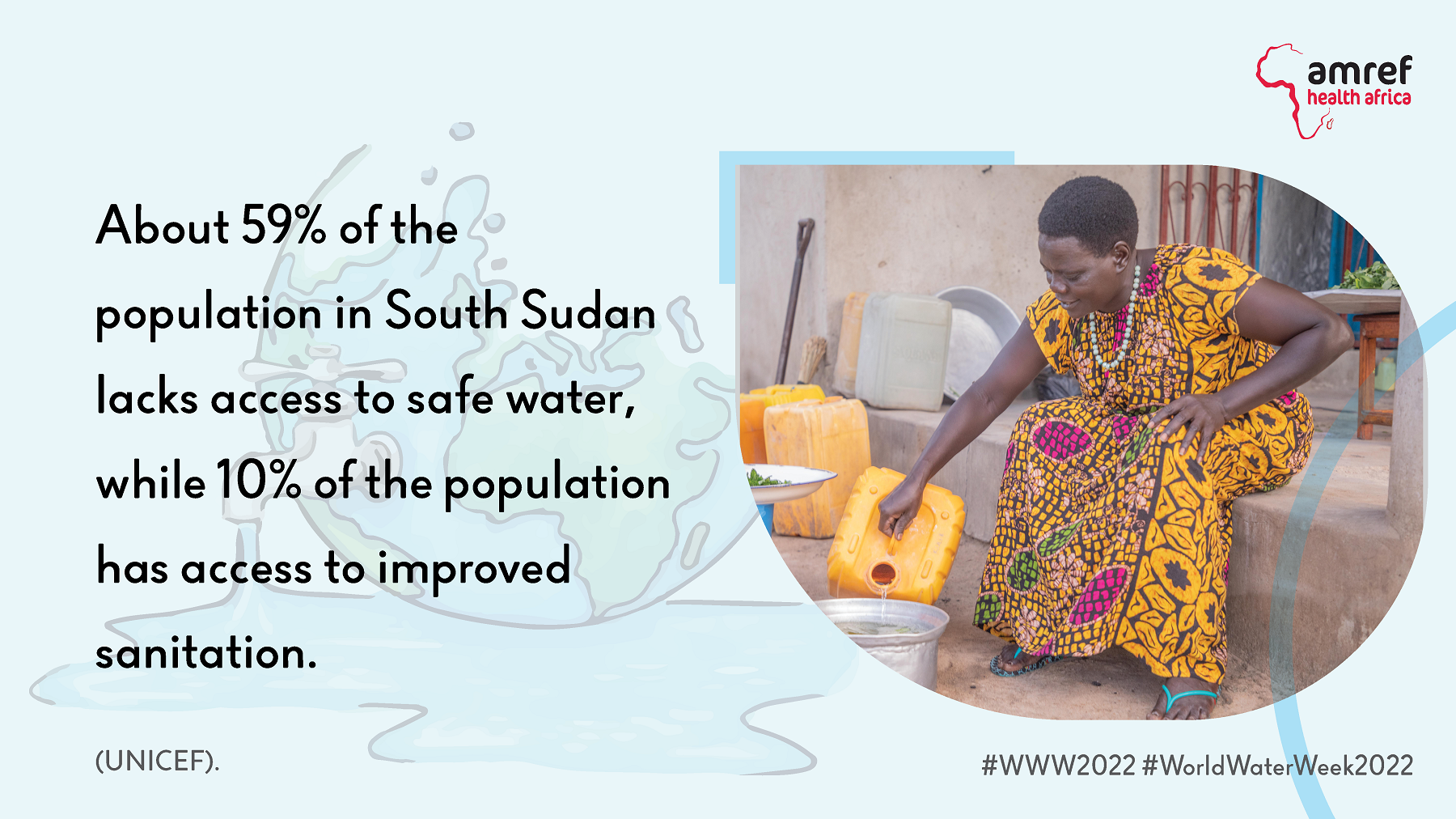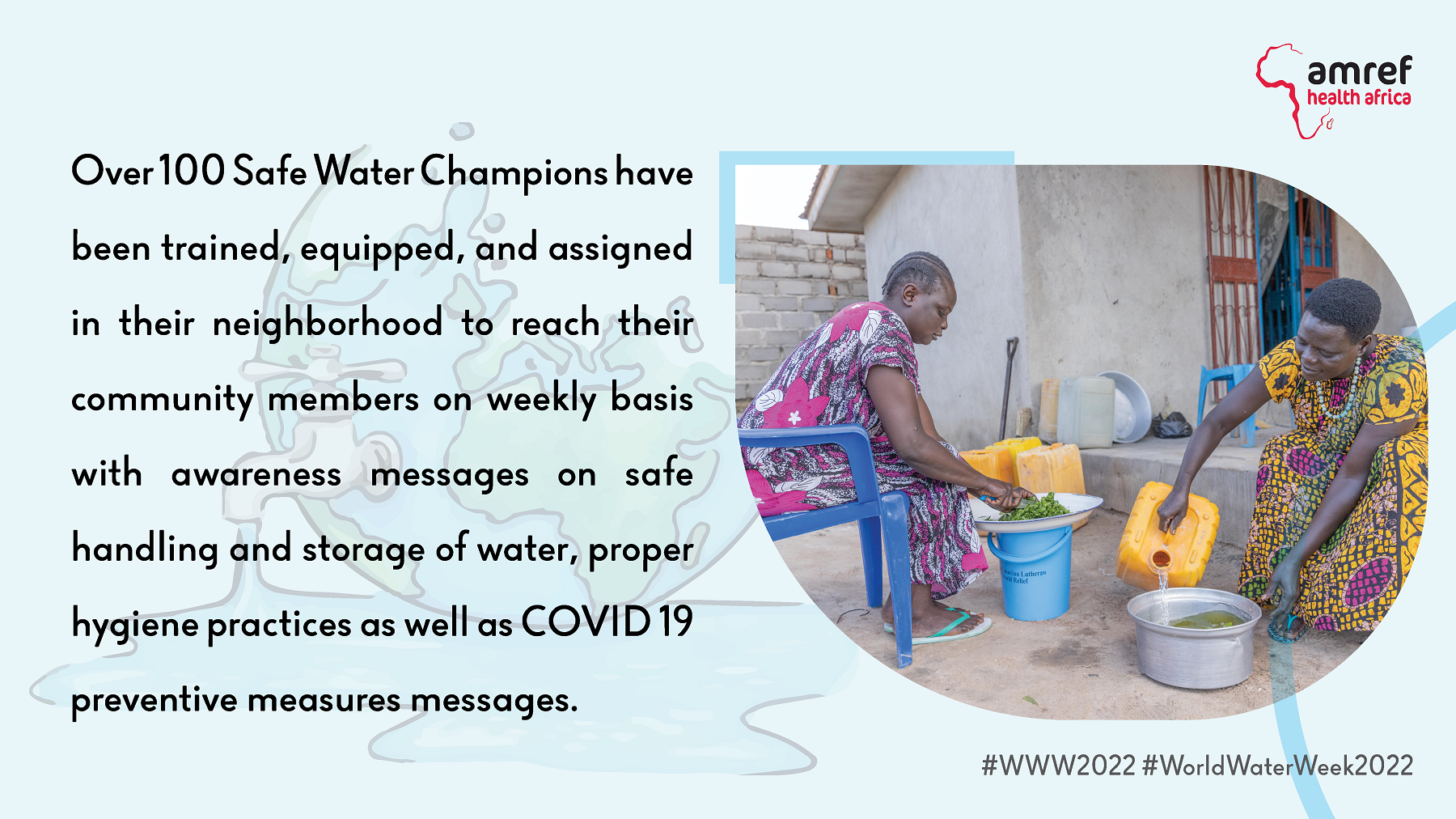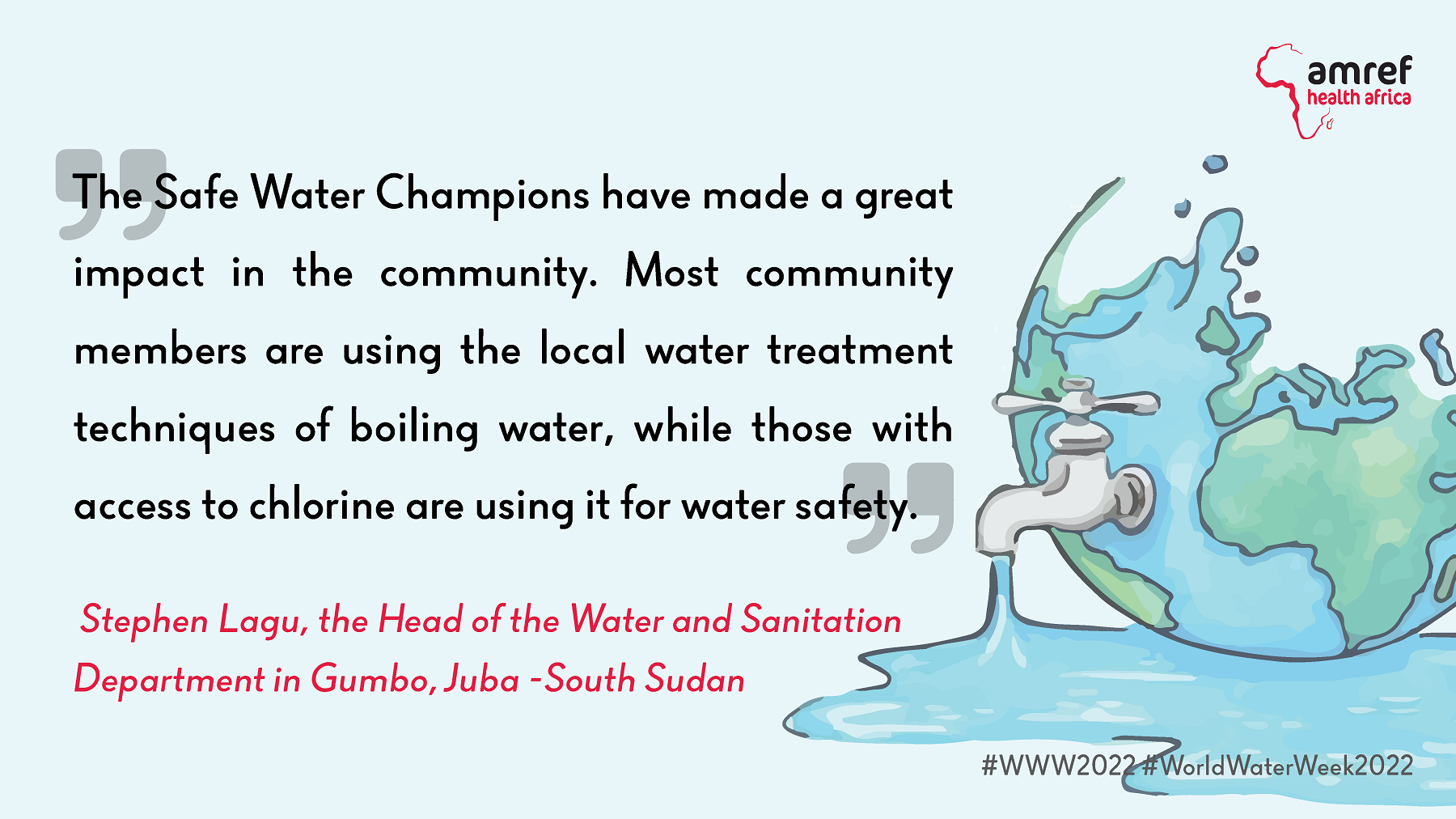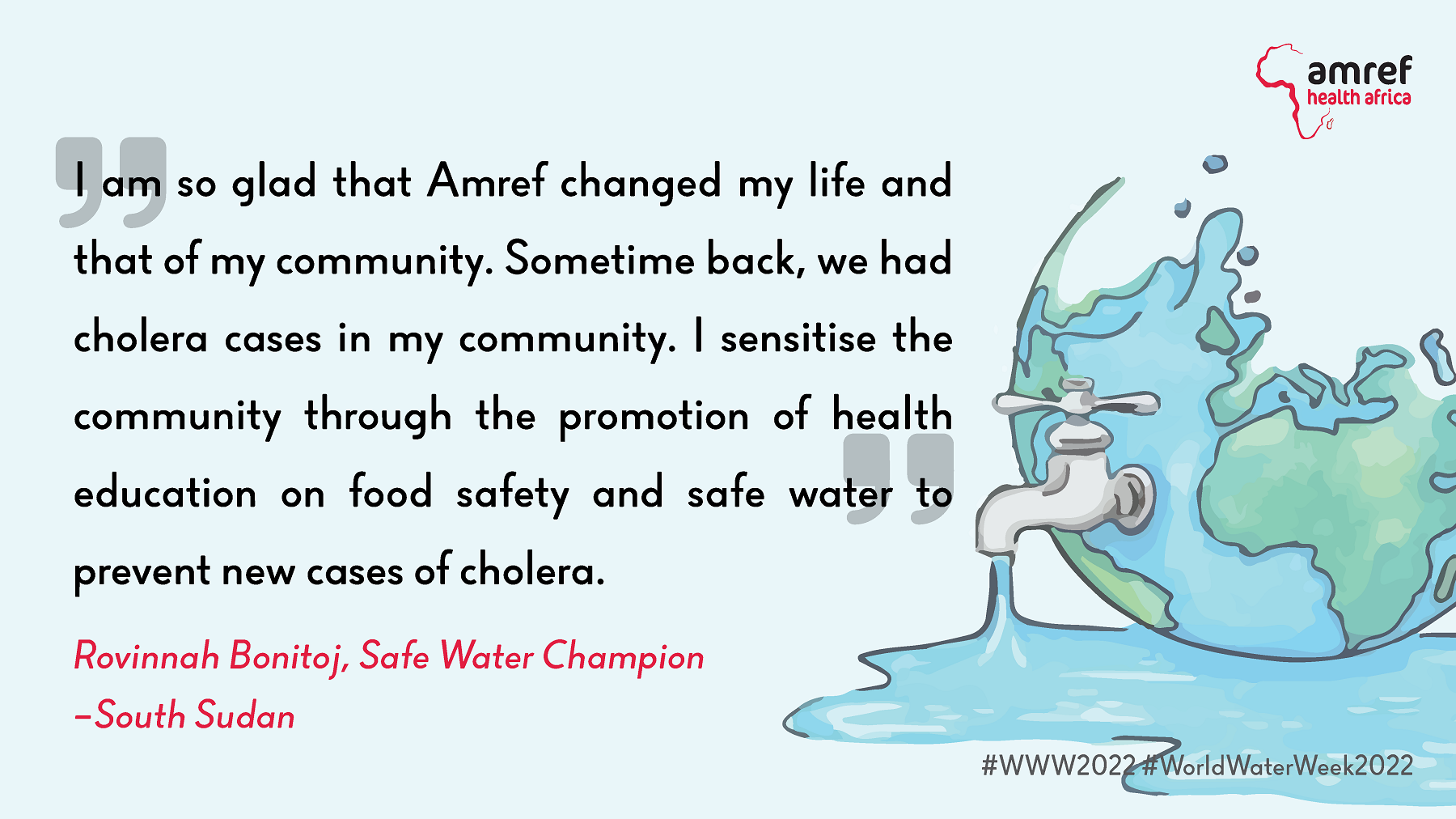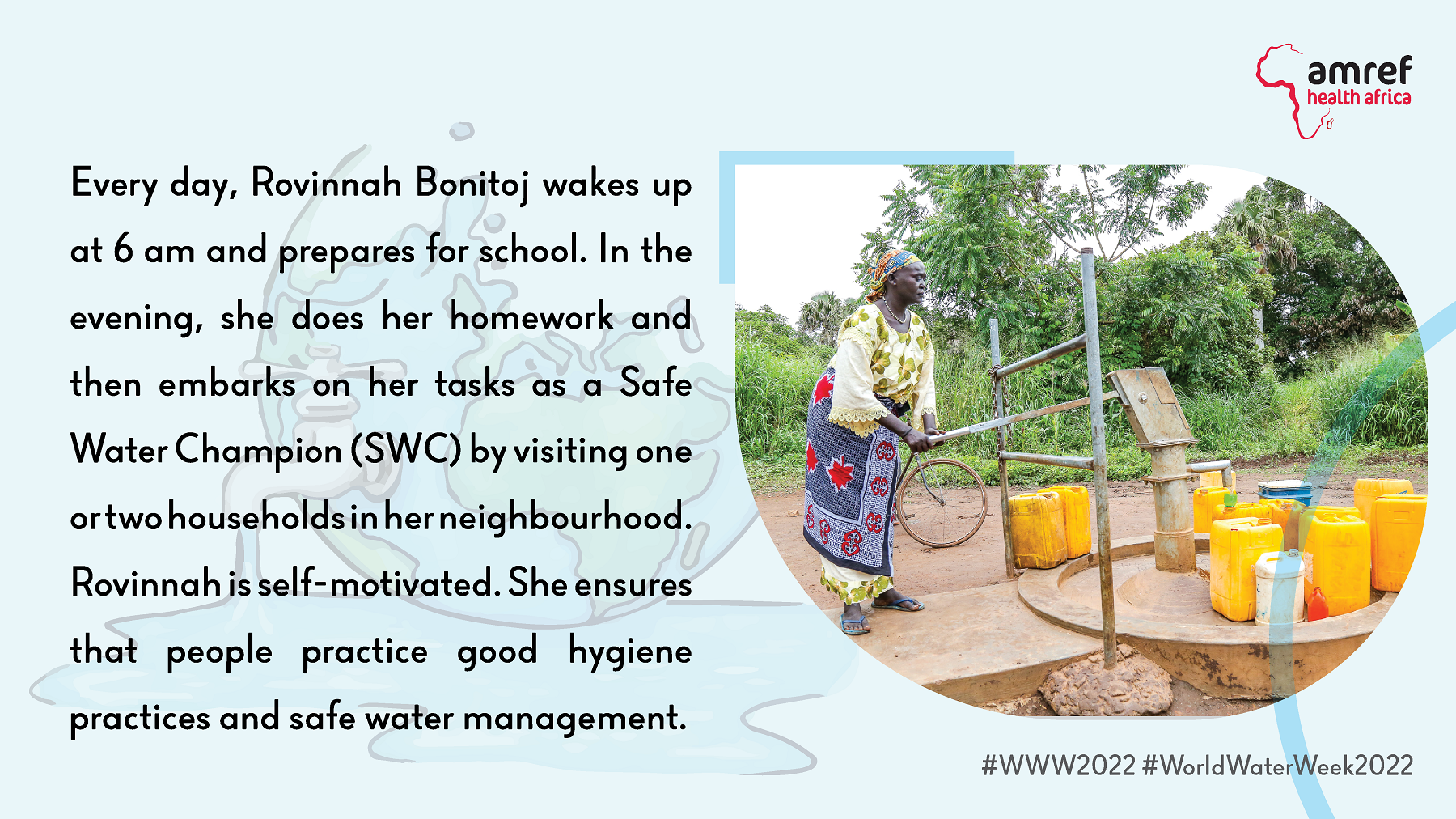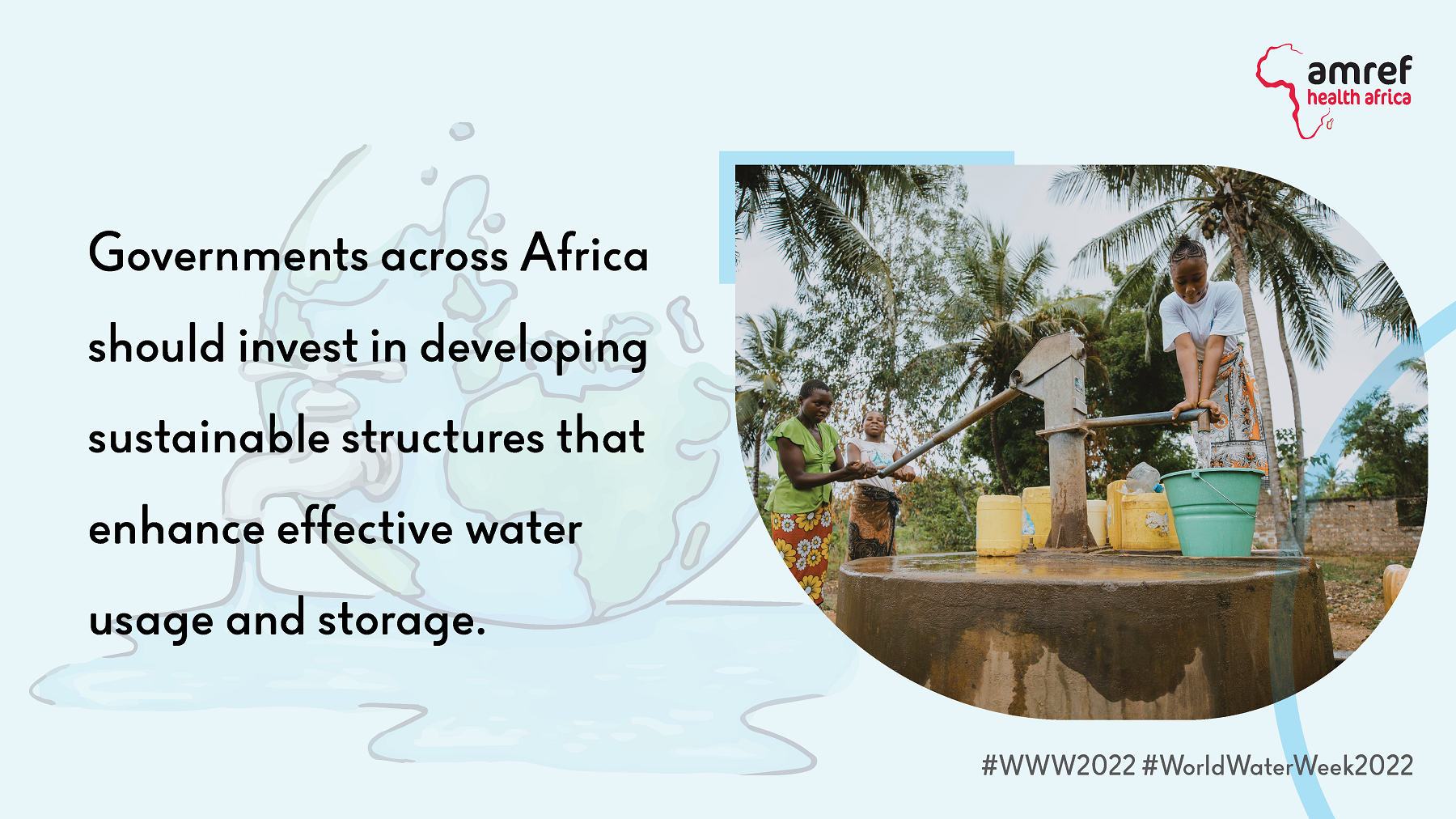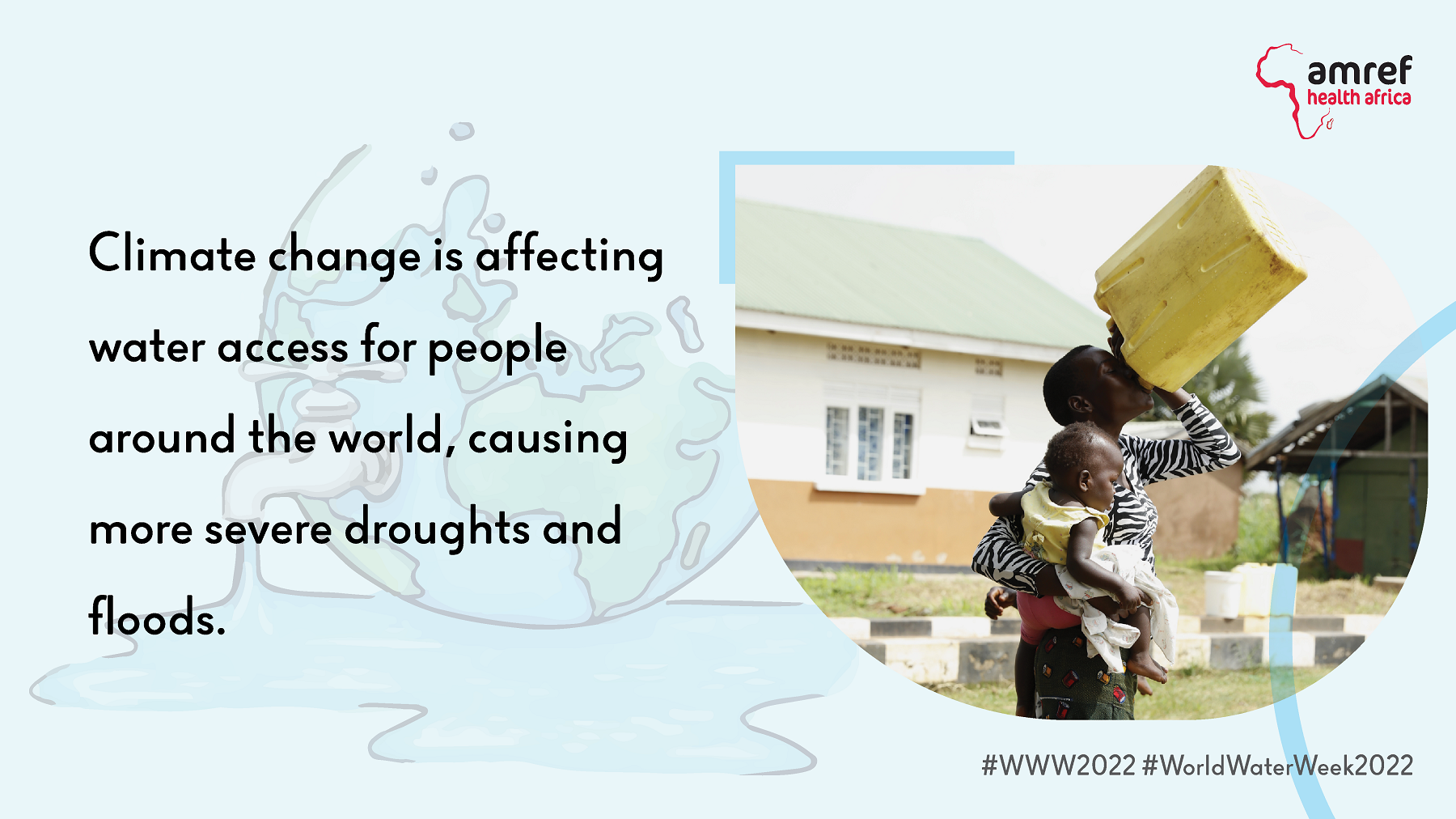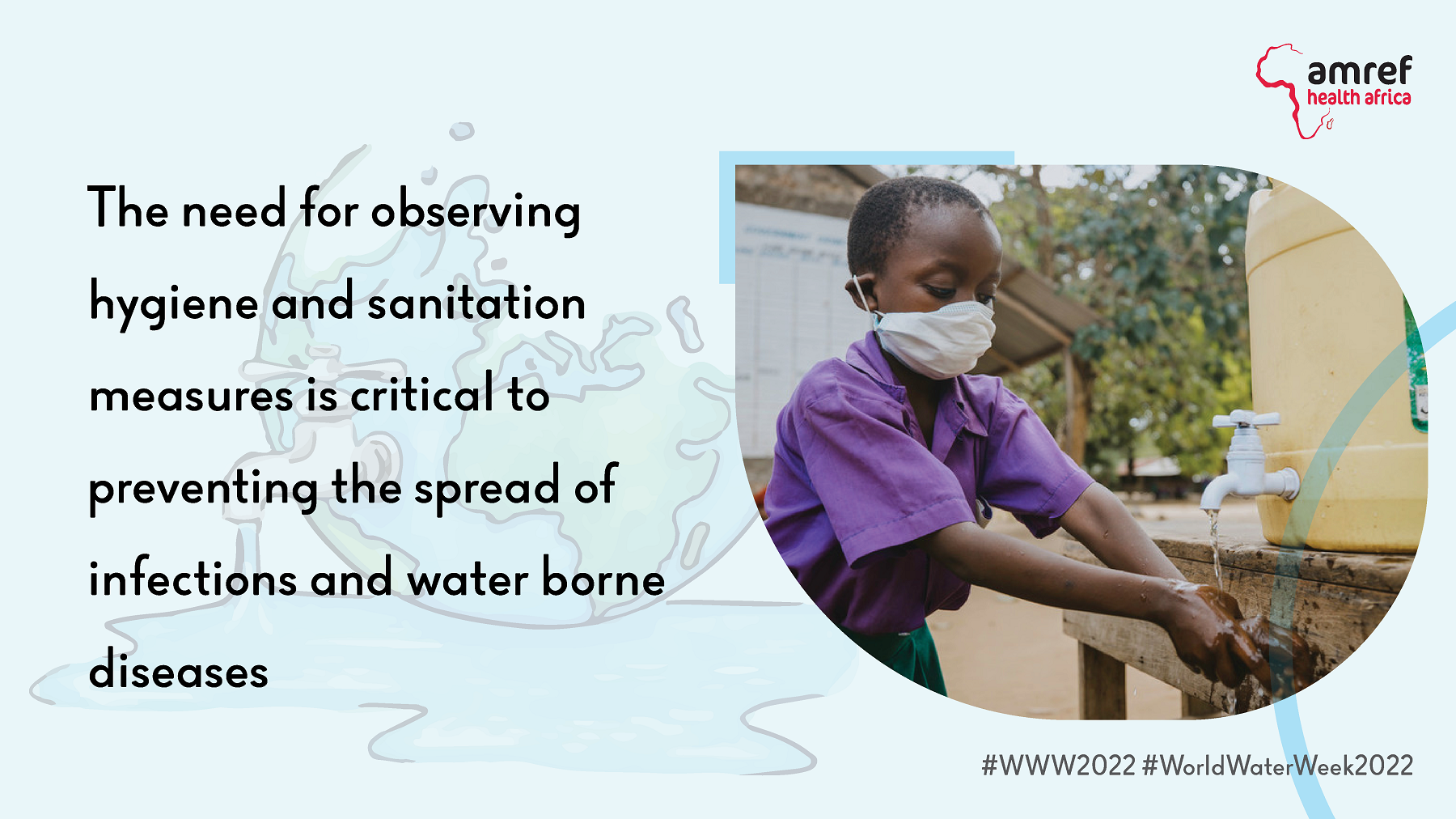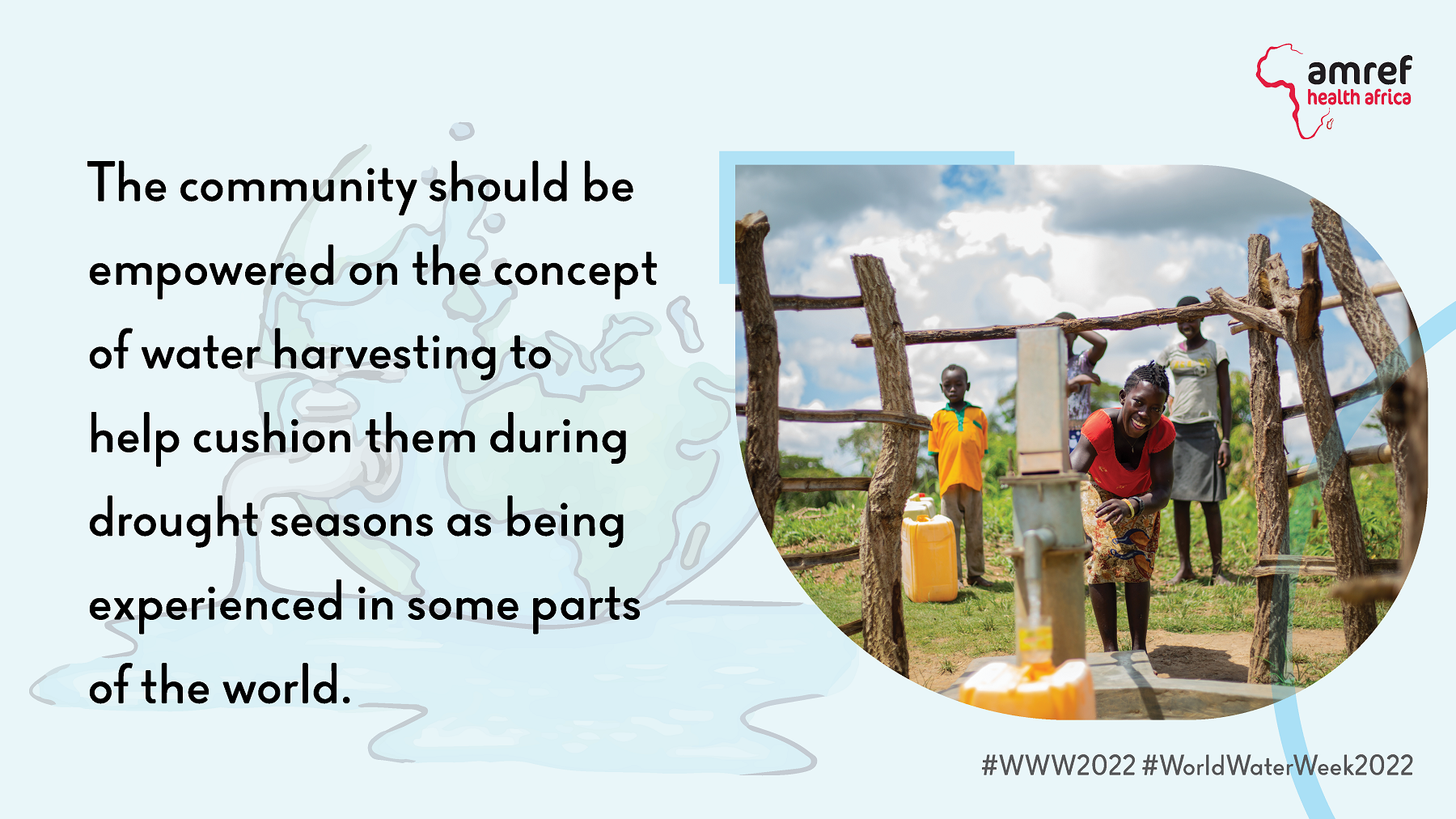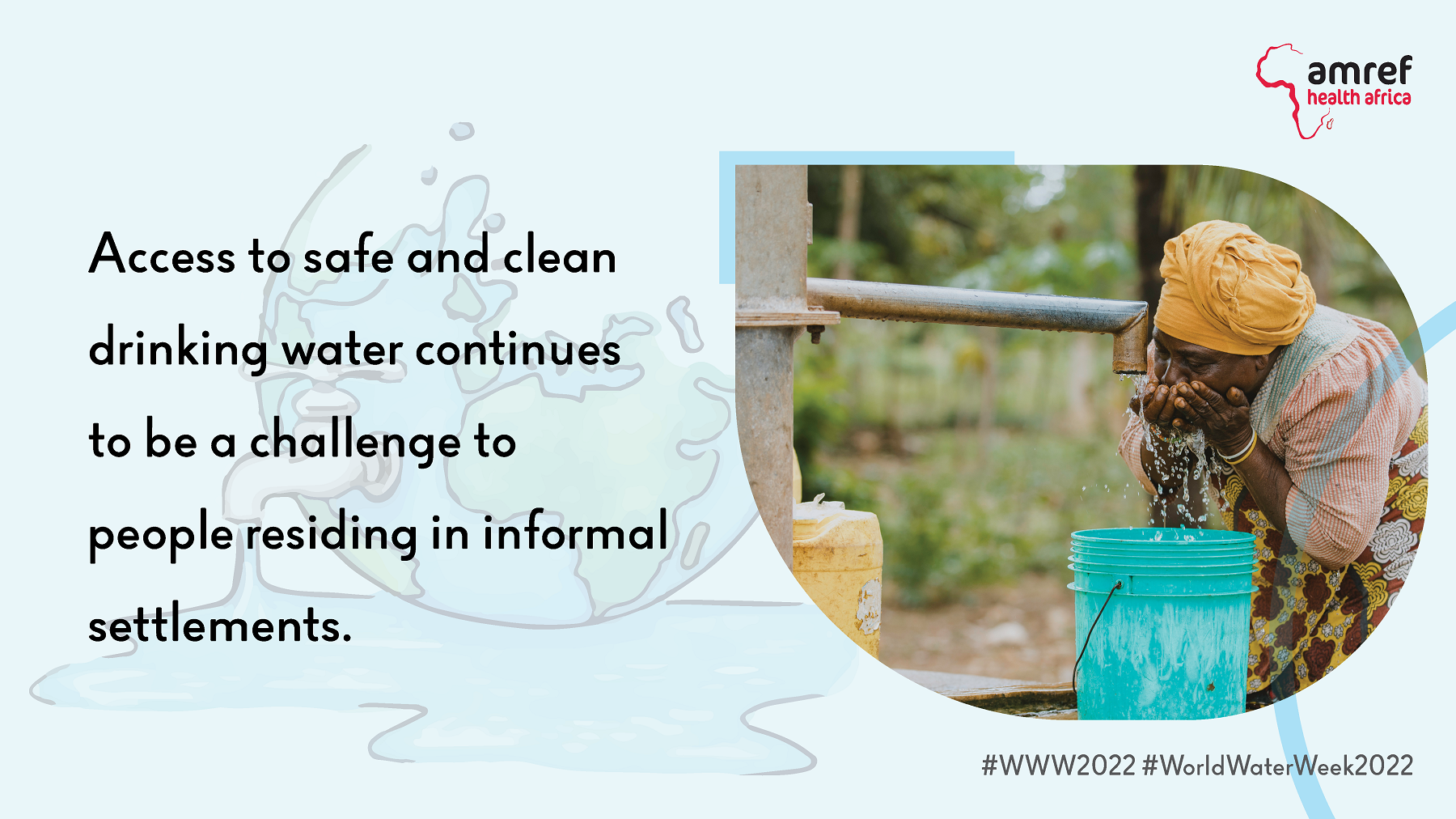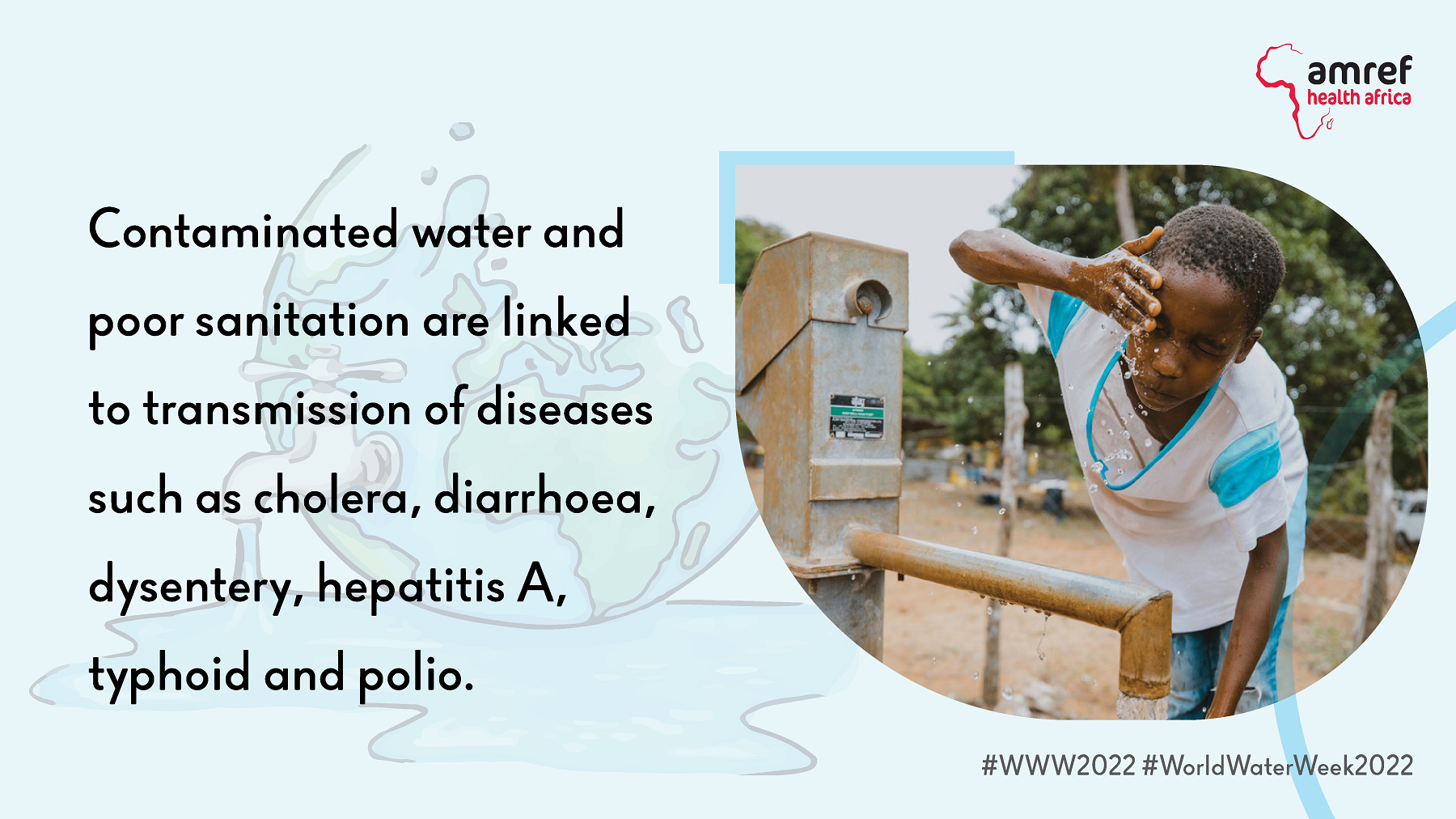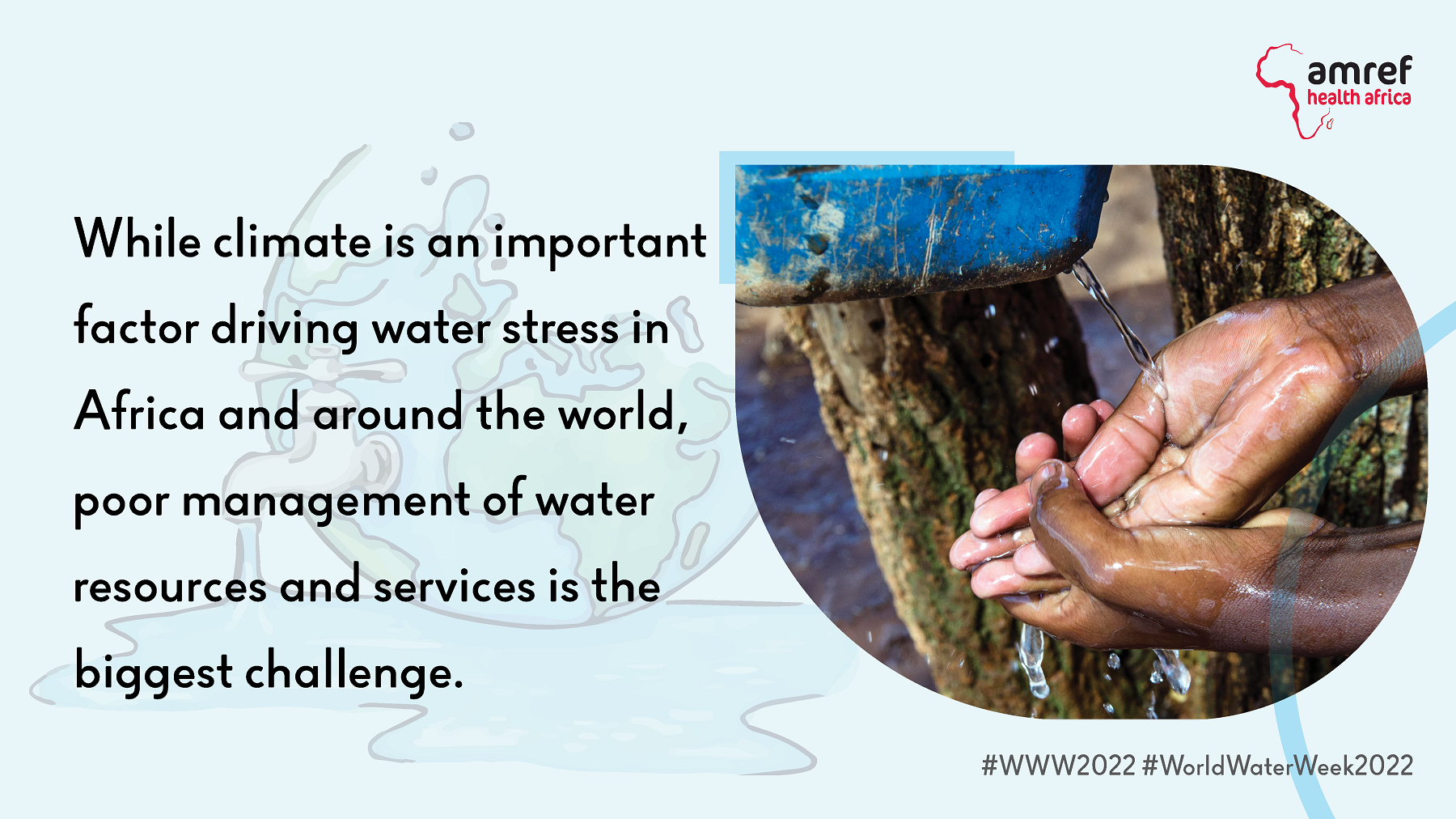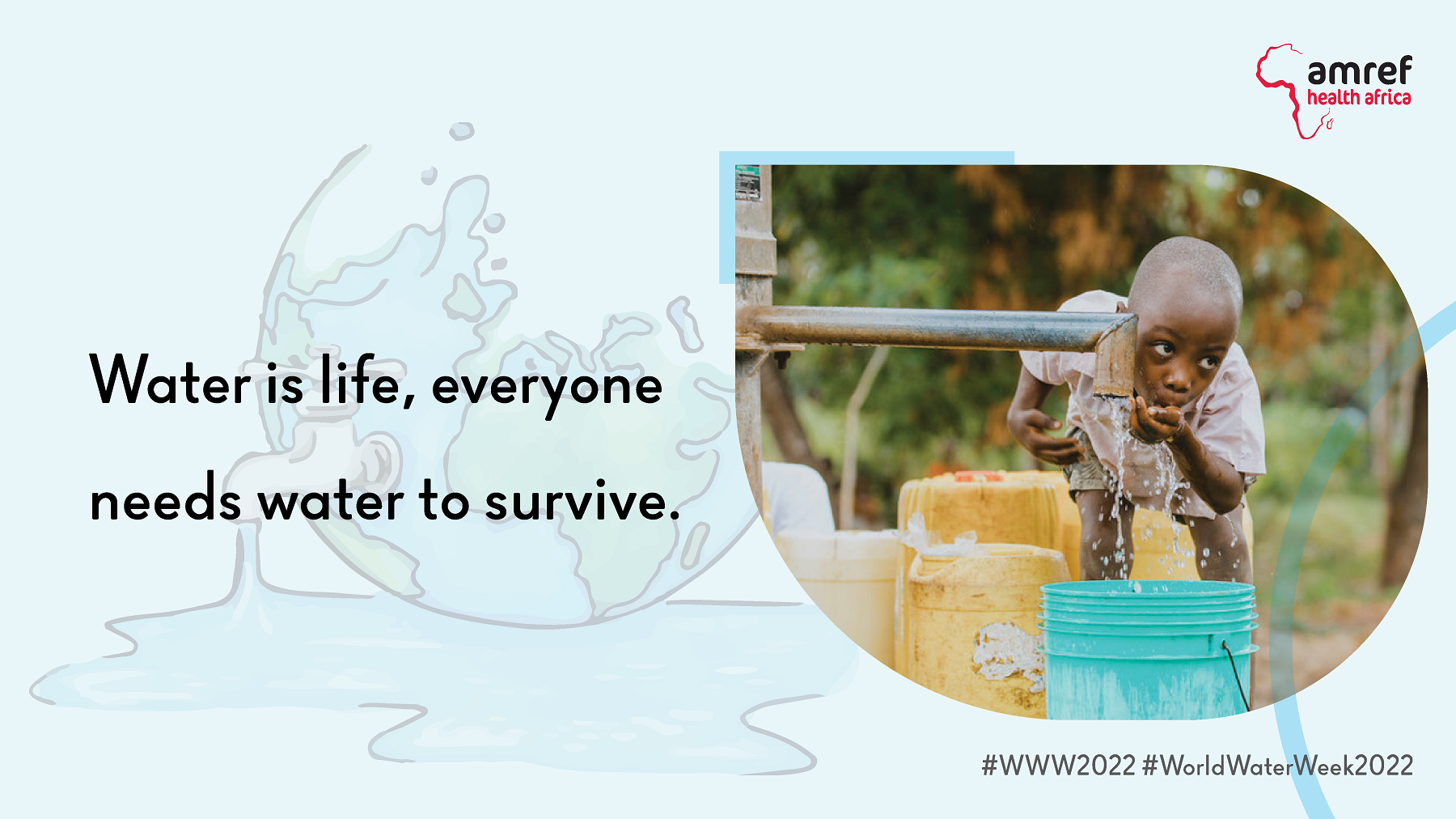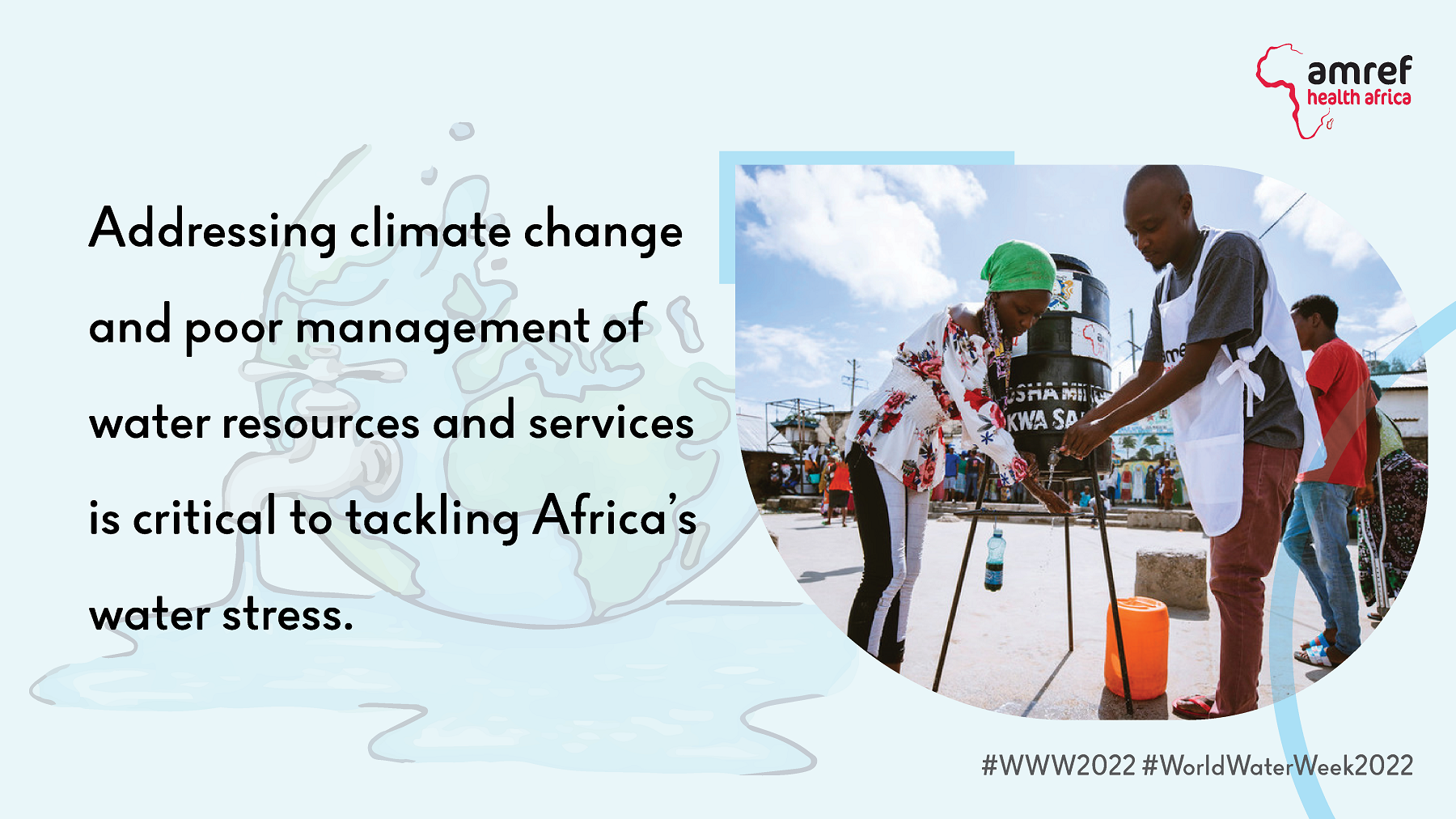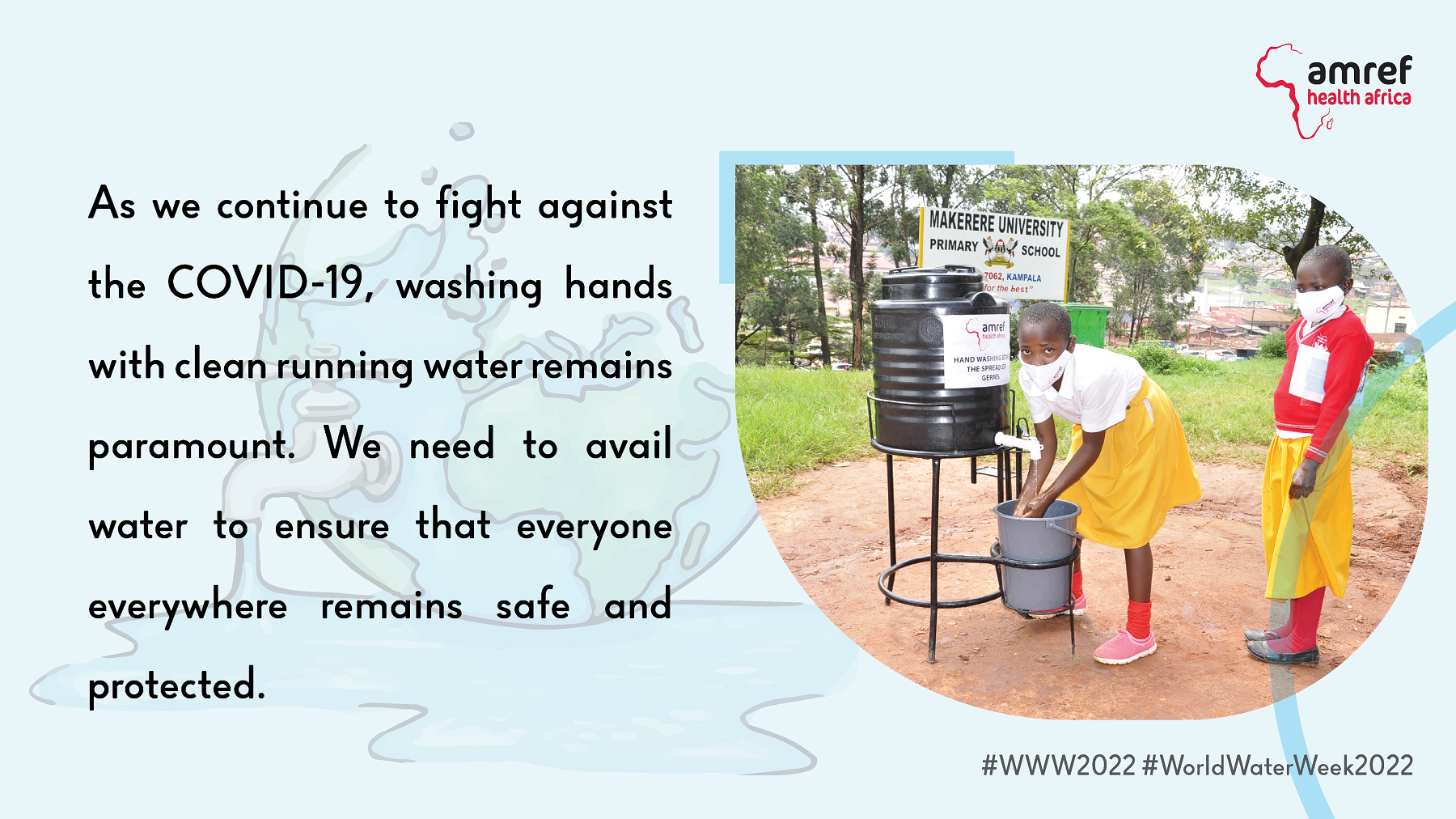World Water Week 2022
April 4- 8, 2022
Theme: Seeing the Unseen: The Value of Water
The value of water is unmatched, especially during health emergencies as seen during the COVID-19 pandemic. Families and their entire livelihoods depend on seeing the unseen value of water across all walks of life. This year, as we mark the world water week, we showcase Amref’s impact to communities with WASH interventions while also amplifying the clarion call to uphold, safeguard and maintain water sources for continued posterity. Advocating for seeing the unseen: the value of water.
Share facts about #WWW2022
These communication tools are available to share and print in celebration of World Water Week. Feel free to display and/or distribute on social media. On Twitter please tag @Amref_Worldwide when posting graphics from this social media toolkit.
# Primary Hashtags
#WWW2022
#WorldWaterWeek2022
# Secondary Hashtags
#AmrefWASHImpact
Videos
Play any video to preview, click the tweet button to share the video on Twitter.
George Brian Community Health Assistant shares his best wishes for #WHWWeek2022 https://youtu.be/Xx0tRI9pNjM
Message to policy makers by Paul Otieno Clinical Officer Homa Bay County #WHWWeek2022 https://youtu.be/mA2hb2Uv0as
George Brian sharing his experience as a health worker during the commemoration of the #WHWWeek2022 https://youtu.be/r6LF-dvm_OQ
Susan Atieno, a Peer Mentor, shares her messages for the 2022 Health Worker Week https://youtu.be/NcJwaPOc-Lw
George Brian, a Community Health Assistant - Migori County, sends a message to policy makers as the world commemorates #WHWWeek2022 https://youtu.be/wGzP-Cbp088
JIBU Esstential COVID 19 Course for Health Workers in Africa https://youtu.be/-towkzzO4gQ
JIBU COVID 19 Course Experiences from Health Workers in Uganda https://youtu.be/iI3ziwMXp3s
The need to strengthen the health workforce and build back better systems to support health workers continues to be critical and takes centre stage as we celebrate health worker week. Here are some insights from Dr Githinji Gitahi. @daktari1
Key Messages and Tweets
Water is life, everyone needs water to survive. #AmrefWASHImpact #WorldWaterWeek2022
Water is a primary component for quality health. It supplies vitamins and minerals to and from the cells, and is vital in removing waste products from individual cells. #AmrefWASHImpact #WorldWaterWeek2022
Failure to drink enough water can lead to dehydration, and it’s more common than we think. #AmrefWASHImpact #WorldWaterWeek2022
Access to affordable, clean, and safe drinking water is a fundamental human right recognised by the United Nations and Goal number six of the United Nation’s Sustainable Development Goals. #AmrefWASHImpact #WorldWaterWeek2022
Climate change is affecting water access for people around the world, causing more severe droughts and floods. #AmrefWASHImpact #WorldWaterWeek2022
Addressing climate change and poor management of water resources and services is critical to tackling Africa’s water stress #AmrefWASHImpact #WorldWaterWeek2022
Water pollution endangers the lives of people and animals that depend on water sources for survival. #AmrefWASHImpact #WorldWaterWeek2022
As we continue to fight against the COVID-19, washing hands with clean running water remains paramount. We need to avail water to ensure that everyone everywhere remains safe and protected. #AmrefWASHImpact #WorldWaterWeek2022
The lack of access to clean water for domestic use impedes the sustainable development in most parts of African countries. #AmrefWASHImpact #WorldWaterWeek2022
The ever-changing weather patterns occasioned by drought have immensely affected the availability of water across the world and especially in developing countries. #AmrefWASHImpact #WorldWaterWeek2022
Failure to safeguard water sources allows the possibility of pollution, especially if animals use the same source to drink water. #AmrefWASHImpact #WorldWaterWeek2022
Access to safe and clean drinking water continues to be a challenge to people residing in informal settlements. #AmrefWASHImpact #WorldWaterWeek2022
Governments across Africa should invest in developing sustainable structures that enhance effective water usage and storage. #AmrefWASHImpact #WorldWaterWeek2022
The community should be empowered on the concept of water harvesting to help cushion them during drought seasons as being experienced in some parts of the world. #AmrefWASHImpact #WorldWaterWeek2022
The need for observing hygiene and sanitation measures is critical to preventing the spread of infections and water borne diseases. #AmrefWASHImpact #WorldWaterWeek2022
90% of sub-Saharan Africa’s rural population depends on agriculture as the primary source of income with at least 95% of the region’s farming being reliant on rainfall- but consequences of unpredictable rainfall, rising temperatures, extreme drought, and lower crop yields expose one of Africa’s poorest communities to increasingly intense climate- and water-related hazards.
Investing in climate-resilient interventions diminish the impact of climate change on Africa’s most vulnerable and marginalised communities. #AmrefWASHImpact #WorldWaterWeek2022
While climate is an important factor driving water stress in Africa and around the world, poor management of water resources and services is the biggest challenge. #AmrefWASHImpact #WorldWaterWeek2022
Climate change makes rainfall more erratic and increases the risks of floods and droughts, hence investing in better water management and infrastructure is becoming even more important to strengthen economies. #AmrefWASHImpact #WorldWaterWeek2022
Investing in sustainable water management systems targeted at vulnerable communities offer a triple dividend: alleviating poverty, supporting jobs and growth, and reducing vulnerability to climate change. #AmrefWASHImpact #WorldWaterWeek2022
We urge African governments to build social safety nets and proactively reduce risks of climate change by investing in climate-resilient water systems, such as water storage and irrigation to vulnerable communities. #AmrefWASHImpact #WorldWaterWeek2022
Globally, 15% of patients develop an infection during a hospital stay, with the proportion much greater in low-income countries where both patients and staff are placed at additional risk of infection and disease when water, sanitation and hygiene services are lacking. #AmrefWASHImpact #WorldWaterWeek2022
Contaminated water and poor sanitation are linked to transmission of diseases such as cholera, diarrhoea, dysentery, hepatitis A, typhoid and polio. (WHO). #AmrefWASHImpact #WorldWaterWeek2022
Amref WASH Interventions – Kenya
Amref through the #WASH projects across Africa, seeks to increase access to sustainable, safe and adequate water, appropriate sanitation and hygiene practices to all, especially people in the last mile communities. #AmrefWASHImpact #WorldWaterWeek2022
The primary goal of Amref is to reduce the prevalence of WASH-related diseases such as dysentery, cholera, trachoma and typhoid. #AmrefWASHImpact #WorldWaterWeek2022
Through the WASH projects, we bring water close to the communities, creating chances for girls and boys to continue with school. #AmrefWASHImpact #WorldWaterWeek2022
We continue to advocate for safe water usage practices through community advocacy and training using safe water champions. This reduces the instances of water misuse and pollution. #AmrefWASHImpact #WorldWaterWeek2022
During the COVID-19 pandemic, Amref collaborated with other partners to promote hands hygiene and sanitation across Africa. This was seen through availing well fitted handwashing stations.
In Kajiado, county, Kenya, women and girls walks long distances in search of water for their animals and for domestic usage. This denies them, especially, young boys and girls the opportunity to go to school. #AmrefWASHImpact #WorldWaterWeek2022
Amref WASH Interventions – South Sudan
About 59% of the population in South Sudan lacks access to safe water, while 10% of the population has access to improved sanitation (UNICEF). #AmrefWASHImpact
Amref Health Africa in South-Sudan in partnership with German Agency for International Cooperation (GIZ) uses the Safe Water Champions (SWCs) as agents of change and involves recruiting and training women from the community on basic knowledge on water, sanitation and hygiene. #AmrefWASHImpact
This approach has contributed to improved hygiene practices and safe water handling at urban communities of Gumbo, Torit, Yei and Yambio municipalities in South-Sudan. #AmrefWASHImpact
Every day, Rovinnah Bonitoj wakes up at 6 am and prepares for school. In the evening, she does her homework and then embarks on her tasks as a Safe Water Champion (SWC) by visiting one or two households in her neighbourhood. Rovinnah is self-motivated. She ensures that people practice good hygiene practices and safe water management. #AmrefWASHImpact
Over 100 Safe Water Champions have been trained, equipped, and assigned in their neighborhood to reach their community members on weekly basis with awareness messages on safe handling and storage of water, proper hygiene practices as well as COVID 19 preventive measures messages. #AmrefWASHImpact
“The Safe Water Champions have made a great impact in the community. Most community members are using the local water treatment techniques of boiling water, while those with access to chlorine are using it for water safety.” Stephen Lagu, the Head of the Water and Sanitation Department in Gumbo, Juba -South Sudan #AmrefWASHImpact
“I am so glad that Amref changed my life and that of my community. Sometime back, we had cholera cases in my community. I sensitise the community through the promotion of health education on food safety and safe water to prevent new cases of cholera.” Rovinnah Bonitoj, Safe Water Champion –South Sudan #AmrefWASHImpact
To complement the work of Safe Water Champions, Amref Health Africa in South-Sudan also produces and plays Jingles as well as conducts Radio Talk shows on Safe Water Handling and Proper Hygiene practices including menstrual hygiene management. This intervention aims to increase water sanitation and hygiene awareness on Households affected communities in Yambio, Torit, Gumbo/Juba and Yei Counties in Western, Central and Eastern Equatorial, South-Sudan.
We had an opportunity to interview Stephen Lagu, the Head of the Water and Sanitation Department in Gumbo, Juba, and South Sudan. He has served in the position since 2003 in Gumbo – a densely populated suburb on the outskirts of Juba where residents experience problems with Water Sanitation and Hygiene (WASH).
Amref Empowers Safe Water Champions to Promote Hygiene and Disease Prevention in South Sudan.
Other Amref Interventions
Amref WASH programme goals and objectives are centred on improved health through better access to water, sanitation and hygiene. WASH projects contribute to the national WASH agenda by modelling effective approaches and delivery models, informing development of an enabling environment and strengthening systems. #AmrefWASHImpact #WorldWaterWeek2022
Through the FINISH Mondial programme, Amref Ethiopia, Amref Kenya, Amref Uganda and Amref Tanzania are working with Amref Netherlands and partners - WASTE and Aqua for All – to build safe toilets by stimulating a well-functioning market for sanitation and hygiene products. #AmrefWASHImpact #WorldWaterWeek2022
The Amref FINISH Mondial programme offers small loans to build water and sanitation facilities through local financial institutions, which households can use if they cannot afford direct payments at once. #AmrefWASHImpact #WorldWaterWeek2022
Amref trains construction workers in professional installation of toilets, and runs advocacy initiatives in partnership with governments to develop policies that further promote government investments in water and sanitation needs of communities.
In 2021, Amref facilitated construction of 45,500 toilets in Ethiopia, Uganda, Tanzania and Kenya with at least 227,500 people benefiting from the project.
Amref WASH interventions have seen demonstrable improvement in latrine coverage (availability and use) as well as access to water for hand washing thus positively impacting sanitation and hygiene behaviours and practices of communities across Africa.
In 2021, Amref Ethiopia recorded an increase in the proportion of communities with improved WASH facilities, access to clean and safe drinking water as well as hand washing, among others. Access to safe water increased from 56.6% during baseline to 68.9% during midline and further increased to 69.8% during the end line evaluations.
As a result of Amref interventions in Ethiopia, the proportion of population who use proper sanitation facilities increased from 58.3% during baseline to 86.6% during end line evaluation surveys in 2021.
In Ethiopia, Amref recorded an increase in the proportion of adequate hygiene practice from 41.3% during baseline to 79% during the end line survey.
In 2021, through Amref Ethiopia interventions, the proportion of the population who had diarrhoea reduced from 11.1% to 2.8% during baseline and end line evaluation surveys. Similarly, the pooled proportion of open defecation reduced from 14.3% during baseline to 7.1% during end line survey.
In 2021, Amref Kenya trained 226 Village Sanitation Committees (VSCs) on sanitation marketing to enable them market different sanitation products, while artisans were trained on product development of facilities such as hand washing stations. This enhanced growth in the local supply chains for sanitation and hygiene products thus creating job opportunities for artisans and local entrepreneurs as well as income for VSCs in the sanitation value chain.

